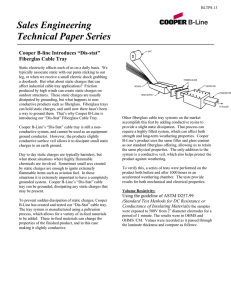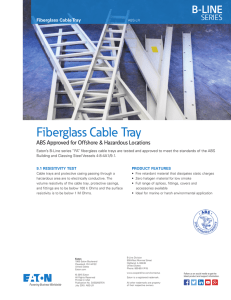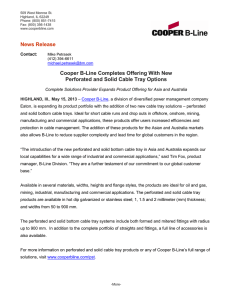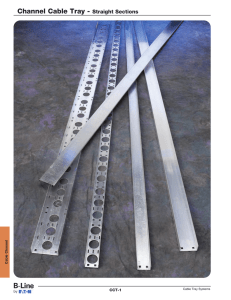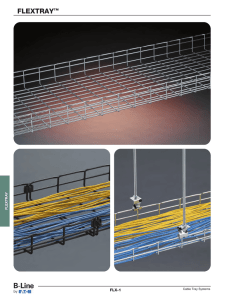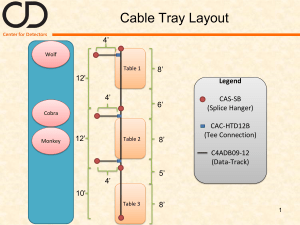Sales Engineering Technical Paper Series Non-Metallic Cable Trays –
advertisement
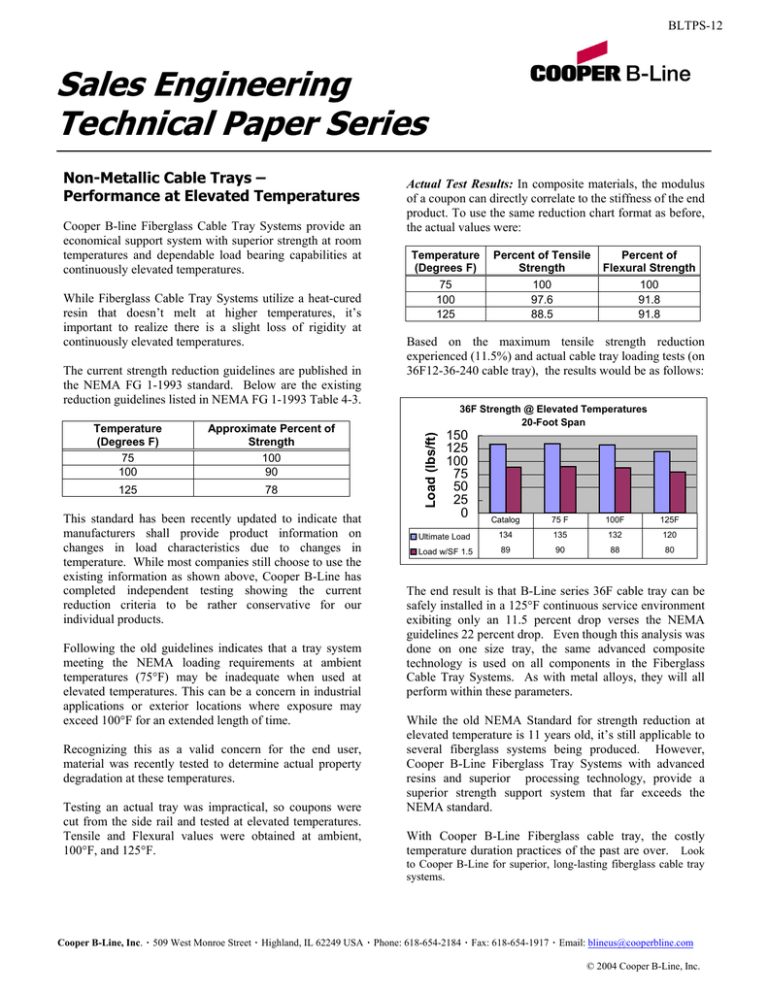
BLTPS-12 Sales Engineering Technical Paper Series Cooper B-line Fiberglass Cable Tray Systems provide an economical support system with superior strength at room temperatures and dependable load bearing capabilities at continuously elevated temperatures. While Fiberglass Cable Tray Systems utilize a heat-cured resin that doesn’t melt at higher temperatures, it’s important to realize there is a slight loss of rigidity at continuously elevated temperatures. The current strength reduction guidelines are published in the NEMA FG 1-1993 standard. Below are the existing reduction guidelines listed in NEMA FG 1-1993 Table 4-3. Temperature (Degrees F) 75 100 Approximate Percent of Strength 100 90 125 78 This standard has been recently updated to indicate that manufacturers shall provide product information on changes in load characteristics due to changes in temperature. While most companies still choose to use the existing information as shown above, Cooper B-Line has completed independent testing showing the current reduction criteria to be rather conservative for our individual products. Following the old guidelines indicates that a tray system meeting the NEMA loading requirements at ambient temperatures (75°F) may be inadequate when used at elevated temperatures. This can be a concern in industrial applications or exterior locations where exposure may exceed 100°F for an extended length of time. Recognizing this as a valid concern for the end user, material was recently tested to determine actual property degradation at these temperatures. Testing an actual tray was impractical, so coupons were cut from the side rail and tested at elevated temperatures. Tensile and Flexural values were obtained at ambient, 100°F, and 125°F. Actual Test Results: In composite materials, the modulus of a coupon can directly correlate to the stiffness of the end product. To use the same reduction chart format as before, the actual values were: Temperature (Degrees F) 75 100 125 Percent of Tensile Strength 100 97.6 88.5 Percent of Flexural Strength 100 91.8 91.8 Based on the maximum tensile strength reduction experienced (11.5%) and actual cable tray loading tests (on 36F12-36-240 cable tray), the results would be as follows: 36F Strength @ Elevated Temperatures 20-Foot Span Load (lbs/ft) Non-Metallic Cable Trays – Performance at Elevated Temperatures 150 125 100 75 50 25 0 Catalog 75 F 100F 125F Ultimate Load 134 135 132 120 Load w/SF 1.5 89 90 88 80 The end result is that B-Line series 36F cable tray can be safely installed in a 125°F continuous service environment exibiting only an 11.5 percent drop verses the NEMA guidelines 22 percent drop. Even though this analysis was done on one size tray, the same advanced composite technology is used on all components in the Fiberglass Cable Tray Systems. As with metal alloys, they will all perform within these parameters. While the old NEMA Standard for strength reduction at elevated temperature is 11 years old, it’s still applicable to several fiberglass systems being produced. However, Cooper B-Line Fiberglass Tray Systems with advanced resins and superior processing technology, provide a superior strength support system that far exceeds the NEMA standard. With Cooper B-Line Fiberglass cable tray, the costly temperature duration practices of the past are over. Look to Cooper B-Line for superior, long-lasting fiberglass cable tray systems. Cooper B-Line, Inc. ٠ 509 West Monroe Street ٠ Highland, IL 62249 USA ٠ Phone: 618-654-2184 ٠ Fax: 618-654-1917 ٠ Email: blineus@cooperbline.com © 2004 Cooper B-Line, Inc.

